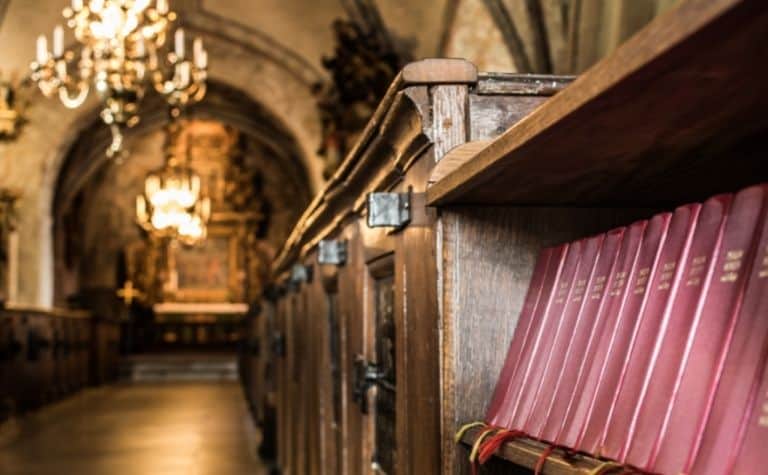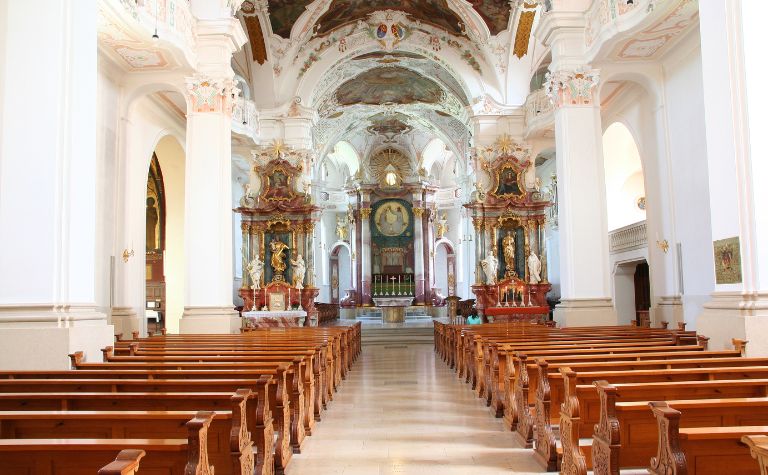Roman Catholicism, Protestantism, and Eastern Orthodoxy are the three historical branches of the Christian faith. Sometimes people in one of those traditions change their allegiance to a different one. The subject of this article is when those in the Protestant tradition become — or convert to — Roman Catholicism.
Converting to Roman Catholicism from Protestantism or any other non-Catholic tradition is multifaceted. It involves inquiry at a local Catholic church and participating in the Rite of Christian Initiation of Adults, which includes taking classes and being baptized and confirmed at an Easter Vigil.
Why do Protestants leave their tradition and become Catholic? How long does it take to convert to Catholicism? What is a well-known example of someone who was Protestant and is now Catholic? Keep reading to learn more.
Also, see How Did the Catholic Church Get So Rich? to learn more.

Why Do Protestants Convert to Catholicism?
For many, leaving one tradition for another is an important life decision. It involves changing churches and a significant transformation of their beliefs and relationships.
- Changing beliefs may include abandoning long-held convictions about God, people, and one’s own life. Parents, churches, schools, and other important aspects of one’s environment help shape and mold a person’s beliefs. To leave those influences and convictions for another worldview is a monumental decision for many people.
- Changing beliefs may include leaving certain relationships or at least experiencing shifts in some of them. For most people, a church isn’t just a building but a community of like-minded people who believe similarly. Leaving established relationships for a new community can be very challenging.
Protestants convert to Catholicism for a variety of reasons. Some reasons are personal, others are theological, and still others are historical. Here are some examples of explanations from those who have decided to convert:
- They sought a more formal and liturgical church experience. Some Protestants become Catholics because they are weary of informal church experiences. Clergy in jeans and rock-band worship discourage them. The Catholic Mass offers them formal services and follows the liturgical calendar. They also appreciate the reverence associated with Christmas, Lent, Easter, Pentecost, and other important days.
- They are convinced that the Catholic church is connected to the 12 apostles through the succession of popes and bishops. Apostolic Succession is “the uninterrupted transmission of spiritual authority from the Apostles through successive popes and bishops, taught by the Roman Catholic Church.” [1] Some Protestants become convinced that this claim is true, and so join the Catholic church.
- They are drawn to the intellectual depth of Catholic theology. Some convert to Catholicism find the church’s theology and doctrine fulfilling. Although rooted in the New Testament and the early church, Protestant theology is only 500 years old. Though some Protestant traditions, like Lutheranism and Calvinism, are founded upon the teachings of Augustine (354-430), for example, converts to Catholicism find the historic branch of Protestantism less buttressed.
- They find stability and security in the history of Catholicism. Eastern Orthodoxy and Protestantism broke off from the Catholic church, not the other way around. Because of this, some Protestants have become persuaded that the Catholic church is the “purest” form of Christianity.
- They felt called to become Catholic. Some convert to Catholicism are comfortable, saying they sensed God guided them to convert. They may have in mind some of the explanations offered above but insist that their primary reason rests in the conviction of the Holy Spirit to leave Protestantism for Catholicism.
Also, see Do Catholics Believe the Pope Speaks Directly to God? to learn more.

How Long Does It Take to Convert to Catholicism?
Conversion stories have personal and formal aspects. Conversions often start with an internal conviction, realization, or sometimes just a curiosity to explore.
In the Catholic church, this is referred to as the Period of Evangelization and Precatechumenate. When a person decides to take the next step toward becoming a member of the Catholic Church, there are certain official procedures that are required.
What is The Rite of Christian Initiation of Adults? The RCIA is the process an adult participates in to become a member of the Catholic church.
“The RCIA, which stands for Rite of Christian Initiation of Adults, is a process through which non-baptized men and women enter the Catholic Church. It includes several stages marked by study, prayer and rites at Mass. Participants in the RCIA are known as catechumens.” [2]
How long does the RCIA last? The length can vary and is partially dependent on the person interested in learning more about the Catholic church and possibly converting.
“The period of the catechumenate can last for as long as several years or for a shorter time. It depends on how the person is growing in faith, what questions they encounter along the way, and how God leads them on this journey. During this time the catechumens consider what God is saying to them in the scriptures, what changes in their life they want to make to respond to God’s inspiration, and what membership in the Catholic Church involves.” [2]
The final step occurs on Easter, “The third step is the Celebration of the Sacraments of Initiation, which takes place during the Easter Vigil Liturgy on Holy Saturday when the catechumen receives the sacraments of baptism, confirmation and Holy Eucharist. Now the person is a fully initiated member of the Catholic Church.”
Also, see How Does a Person Become a Catholic Cardinal? to learn more.

What Is a Well-Known Example of a Protestant Becoming Catholic?
In recent years, a noteworthy and news-making example of a Protestant becoming Catholic is author Mark Galli. Galli graduated from a Protestant seminary (Fuller Theological Seminary), was a Protestant pastor (Presbyterian), and for 20 years worked for the leading Protestant evangelical magazine (Christianity Today), including as editor.
Galli didn’t convert from Presbyterianism to Catholicism. He changed from Presbyterianism to Anglicanism and then from Anglicanism to Catholicism. In an interview, Galli said, “I’m not rejecting evangelicalism. I’m only taking Anglicanism deeper and thicker.” [3]
Galli participated in and completed the RCIA process in 2018 (see above). Since then, he has attended Mass daily and confession twice a month.
Galli says his decision to become Catholic is a return to the church where he was baptized as a boy. Some speculated that Galli’s decision was rooted in adopting liberal political, social, and theological views, but he denies these allegations.
Please see the related articles below.
References:
[1] Definition from Oxford Languages
[2] Source
[3] Source
Source
Source
Related Questions
Catholic vs. Protestant vs. Orthodox: What's the Difference?
Roman Catholicism, Protestant Christianity, and the Eastern Orthodox Church are the three historical branches of the Christian religion. Each tradition traces its doctrines and practices to the New...
Many people know that the terms "Protestant" and "non-denominational" are associated with Christianity. Sometimes the terms describe churches; other times, they describe people. But what is the...
